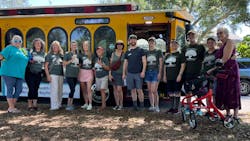Fare collection updates: Community Transit, ECO Transit, PSTA
Community Transit in Snohomish County, Wash., will eliminate commuter bus fare in September while ECO Transit in Eagle County, Colo., has launched account-based ticketing (ABT) for riders and Pinellas Suncoast Transit Authority (PSTA) in Tampa, Fla., will give unlimited transit rides to residents of the St. Petersburg’s Historic Kenwood Neighborhood Association.
Community Transit
The Community Transit Board has voted to eliminate the agency’s commuter bus fare in September. The Snohomish County transit agency currently charges a higher fare for commuter routes that travel to Northgate and downtown Seattle, Wash. After Link light rail extends to Snohomish County, Community Transit will discontinue the routes so there is no need for the higher fare category.
“The arrival of congestion-free light rail in Snohomish County will enable exciting improvements to Community Transit’s network,” said Ric Ilgenfritz, Community Transit CEO. “This change to a single, standard fare supports these improvements and helps make riding transit an even easier choice.”
Starting Sept. 1, all standard adult fares will be $2.50 and will apply to local bus, Swift, Zip Alderwood Shuttle and DART paratransit services. The new rate also applies to Community Transit Express routes that will be introduced on Sept. 14. Reduced fares for ORCA LIFT, disabled and Medicare riders will remain the same at $1.25. Riders 18 and under ride for free. Community Transit says ORCA cards are the easiest way to pay and offer savings when transferring between different transit agencies. Customers can also pay with cash using exact change.
Community Transit notes that although its buses will no longer serve Northgate and downtown Seattle, Route 424 will be maintained, as it does not travel on I-5 like the other commuter routes. Route 424 riders will move to the standard $2.50 fare. Other Seattle-bound riders will connect to Link light rail at Lynnwood, Mountlake Terrace or Shoreline to complete their trips to Seattle. Some Sound Transit buses will continue to serve Seattle.
The agency held a public comment period and conducted a federally mandated Title VI analysis, which found the fare change does not have a disparate effect on minority or low-income populations.
ECO Transit
ECO Transit has added ABT powered by Masabi’s Open Platform, Justride. ECO Transit riders can now use the ECO Tickets app to simply tap and ride without needing to buy a ticket or select a fare.
Justride delivers fare capping, ensuring all riders are guaranteed to pay the lowest possible fare for their journey, regardless of how they pay for travel. Justride automatically calculates and deducts the correct fare from riders’ accounts to deliver enhanced fare equity and increased accessibility. Single journeys are charged at $3 and the system caps fares at the price of an ECO Transit monthly pass - which costs $63.
The phased ‘Mobile-First’ deployment began with the launch of the ECO Tickets app in late 2022, enabling riders to purchase tickets using their smart devices. Building on this success, the modular design of the Masabi platform has made it straightforward to deploy ECO Transit’s new fare system in phases, providing an easy and low-risk upgrade path from mobile ticketing to a full ABT solution. Further upgrades are planned, including the introduction of ECO Transit smartcards, allowing everyone to tap and ride.
“Following the successful launch of the ECO Tickets app with Masabi in 2022, we were keen to develop the solution further to extend the convenience and accessibility to allow riders to board with a tap of their device - knowing they’d always be charged the best price,” said Larry Tenenholz, acting director at ECO Transit. “This upgrade to the platform will greatly improve passenger experience, offering flexibility and accessibility for our customers to undertake journeys as they please, safe in the knowledge that they will be charged the best possible price for their journey.”
“There is a growing demand from transit agencies across the world to provide their customers with simple, contactless and equitable systems to pay for their trips,” said Brian Zanghi, CEO of Masabi. “Masabi’s Fare Payments-as-a-Service platform is delivering a cutting-edge account-based ticketing solution quickly and cost-effectively with a low-risk phased deployment and enabling ECO Transit to provide its customers with a convenient fare payment experience that offers affordable, equitable fares, no matter how much or little they travel. It is a testament to Masabi’s ABT solution that ECO Transit are the third Colorado transit agency to launch.”
PSTA
PSTA has reached an agreement with residents of St. Petersburg’s Historic Kenwood Neighborhood Association that will allow the association to become the first in Florida to receive passes for unlimited rides on transit—including every bus route and the SunRunner.
Under the groundbreaking agreement, every resident can receive a UPASS, or Universal Pass, as a benefit of their neighborhood association membership at no additional cost to them. They can then tap to ride unlimited buses and the SunRunner to travel the county without worrying about finding parking, coping with traffic or paying for gas.
“By eliminating the cost barrier associated with riding the bus and the SunRunner, we are ensuring that every resident has the ability to travel freely across Pinellas County,” said PSTA CEO Brad Miller. “This will make it easier for people to commute to work, attend school, access healthcare services and take part in community activities.”
Through the partnership, the neighborhood association will pay for UPASSes at a discounted rate and make them available to every resident who has paid their membership fees. Procedures are in place to deactivate passes when a card is lost or a resident moves out of the neighborhood. For the pilot program, PSTA has created a template that can be repeated in other neighborhoods in the future.
“The Historic Kenwood Neighborhood is one-of-a-kind but there’s no reason this partnership should be one-of-a-kind. What we’re announcing today can absolutely become a model for other neighborhoods in our community and across the United States,” said St. Petersburg City Council Member Richie Floyd.
PSTA notes Kenwood was one of Tampa Bay’s first “streetcar suburbs.” A trolley line connected Kenwood to downtown St. Pete before most people owned cars. The trolley ran on tracks down Central Avenue. That transit option—which mirrors the SunRunner route the city has today—made it possible for people to commute to work and stay connected to the community.
“That transit connection 100 years ago allowed St. Petersburg to flourish and this new approach to transit will help write the next chapter of St. Pete’s story,” said Brad Miller, PSTA CEO.
At a ceremony on June 4 in Kenwood’s Seminole Park, the first neighborhood UPASS was presented to Kenwood resident and community leader Megan Basnett. A longtime advocate for smart growth, Basnett is a founding Committee Member for Car Free St. Pete and Secretary of St. Pete’s Council of Neighborhood Associations. Basnett then stepped inside one of PSTA’s modern trolleys and tapped her new UPASS to activate it for a ceremonial “first ride.”
“With our fabulous, historic homes, we love to celebrate our past but it’s just as important for us to look ahead to the future,” said Alexis Baum, Historic Kenwood Neighborhood Association treasurer. “Less traffic and more time to spend together. Saving money on gas and protecting our environment. It just makes sense.”
About the Author
Brandon Lewis
Associate Editor
Brandon Lewis is a recent graduate of Kent State University with a bachelor’s degree in journalism. Lewis is a former freelance editorial assistant at Vehicle Service Pros in Endeavor Business Media’s Vehicle Repair Group. Lewis brings his knowledge of web managing, copyediting and SEO practices to Mass Transit Magazine as an associate editor. He is also a co-host of the Infrastructure Technology Podcast.

